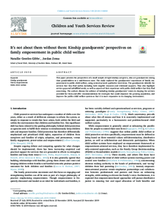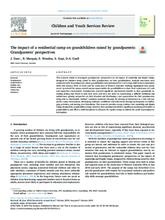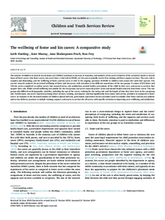Displaying 141 - 150 of 608
This paper reports a small qualitative research study where 10 sets of grandparents were interviewed to explore their journey to becoming GSGs and to theorize their subsequent experiences.
The authors of this study conducted a qualitative 2-year study to investigate informal caregivers’ motivations, assets, and needs.
This article describes the development of two parenting groups – Nurturing Attachments and Foundations for Attachment, devised to provide much needed support for foster, residential and kinship carers and adopters parenting children and young people of all ages. Both programmes are informed by the Dyadic Developmental Psychotherapy (DDP) model.
This country care review includes the care related Concluding Observations adopted by the Committee on the Rights of the Child and the Committee on the Rights of Persons with Disabilities.
This paper presents the perspectives of a small sample of eight kinship caregivers, who are grandparents raising their grandchildren in a mid-Western state [in the USA].
This research aimed to investigate grandparents’ perspectives on the impact of Leadership and Respite Camps, designed for children being raised by their grandparents, on their grandchildren.
The purpose of this study was to examine factors related to unintentional child injury requiring medical attention, including child welfare placement type, child behavioral problems, caregiver characteristics, and neighborhood factors.
The current research explores the perceived wellbeing of foster and kin carers, with attention to the different experiences of the two groups.
This book draws together for the first time some of the most important international policy practice and research relating to education in out-of-home care.
The aim of this study is to examine mental ill-health amongst children known to social services based on care exposure including those who remain at home, those placed in foster care, kinship care or institutional care and the general population not known to social services.




